Montana Tech alumna officiates U.S. Olympic Team Trials – Swimming for a second time
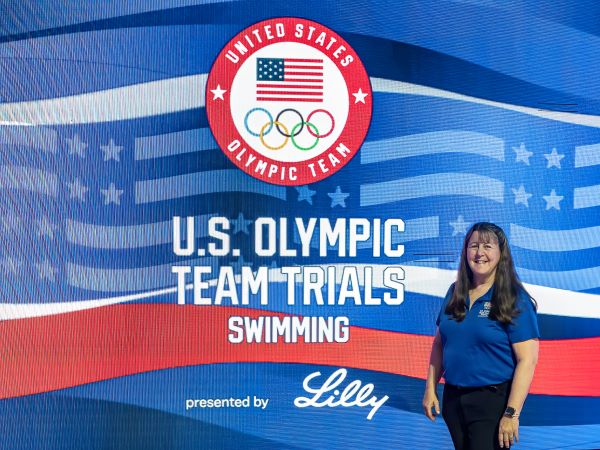
All photos courtesy of Susan Huckeby
Susan Huckeby’s journey to the U.S. Olympic Trials as a swimming official begins with her own children’s swim practices, many of which were at the Montana Tech pool.
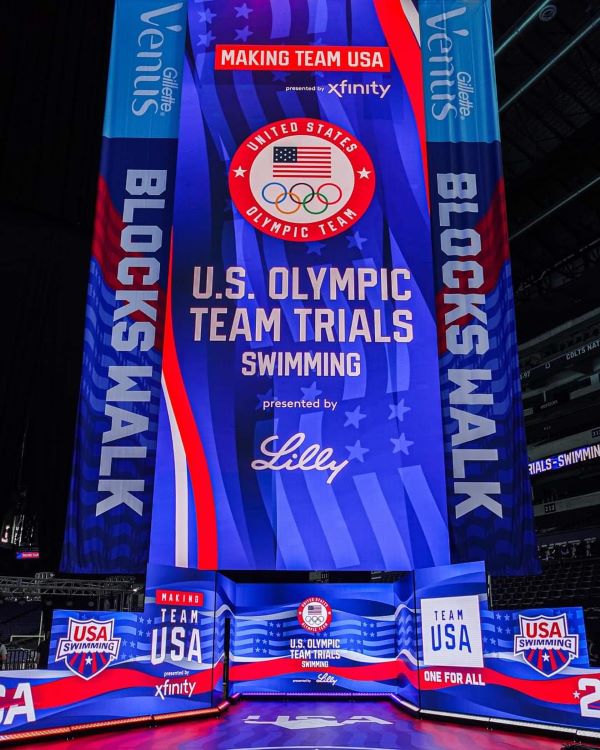
Huckeby (B.S. Mining Engineering, ’83) and husband Ron (B.S. Mining Engineering, ’82) are parents to six children: Josh (Mechanical Engineering, ‘09), Sarah (Civil Engineering, ‘11), Rebekah (Radiologic Technology, ’13, B.S. Neuroscience and Cell Biology from Montana State University, ’14, Doctorate of Medicine from University of Washington School of Medicine ‘16), Rachel Krug (attended Montana Tech and transferred to Montana State University to earn a B.S. Animal Science, ’15), Lydia Mortensen (B.S. Mining Engineering ‘16) and Andrew (A.A.S. Welding, ’16, B.S. Mechanical Engineering, ’20).
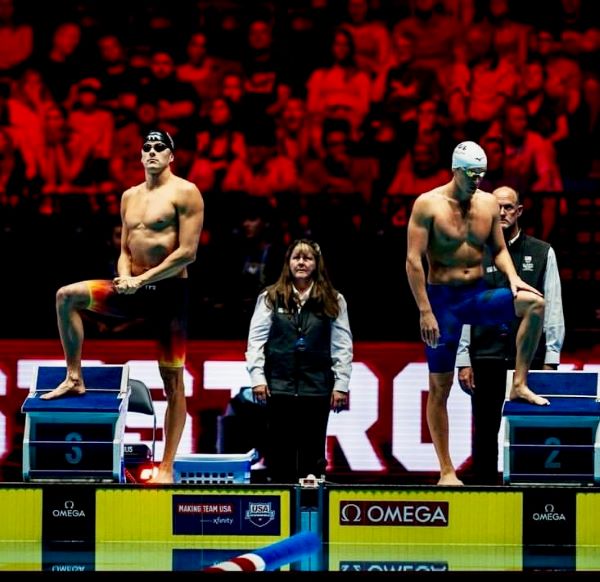
All six children swam competitively.
“Our children swam with the Butte Tarpons Swim Team,” Huckeby said. “We practiced for many years at Montana Tech. Ron took Josh, Sarah, and Rebekah to their first swim meet, the Spook Splash, in Idaho Falls. He came home and told me I should take the kids to the next swim meet and train to become an official. The kids and I went to the MAC Fall Invite in Missoula at Griz Pool a couple weeks later. I watched the swim meet the first day and asked how to become an official. The next morning, I attended my first officials meeting and started training on deck.”
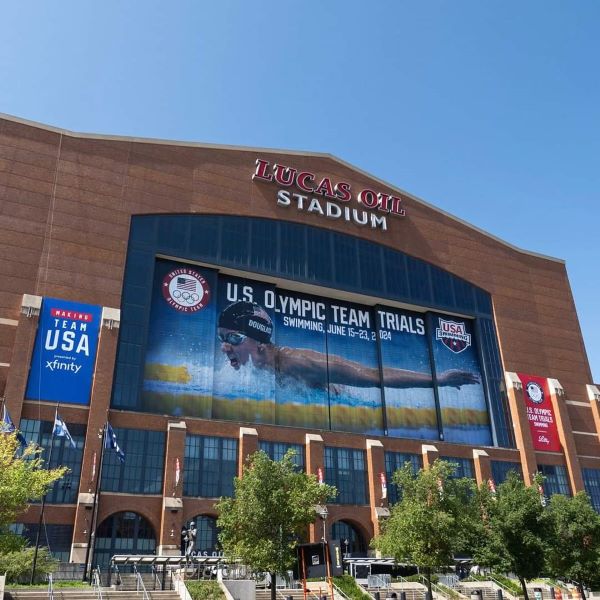
A person can become a certified USA Swimming Official in different positions on deck such as a stroke and turn judge, chief judge, starter, deck referee, administrative referee, or administrative official. There are also different levels of certification for each position. Each position and each level have different training requirements including specific hours of training tie on deck with a trainer, watching training videos, completing a clinic for the specific position and passing a written test. Higher certifications such as N2 (the old national certification) and N3 (the old national championship certification) require a specific number of sessions worked in the position being evaluated prior to attending an official’s qualifying meet where the official is evaluated on deck in that position by a certified evaluator/mentor.
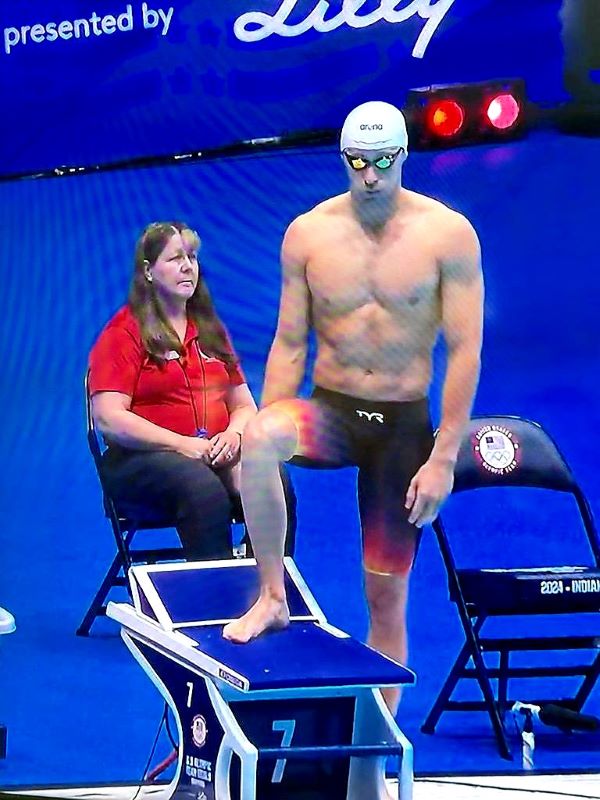
Huckeby has N3 certifications as a stroke and turn judge, chief judge, starter, deck referee and administrative referee.
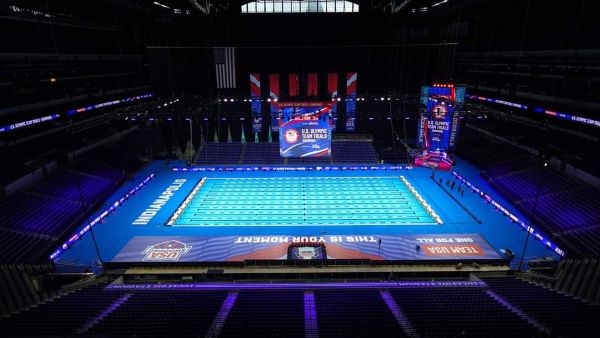
“To recertify in those positions, I generally must travel to large out of state meets where the evaluations are being offered,” Huckeby said “I am also an N3 evaluator for stroke and turn, chief judge, and administrative referee as well as an N2 evaluator in all positions. To become an N3 evaluator the official must work in that specific position at a national championship meet and then be recommended to become an evaluator. The application is reviewed by the national officials committee.”
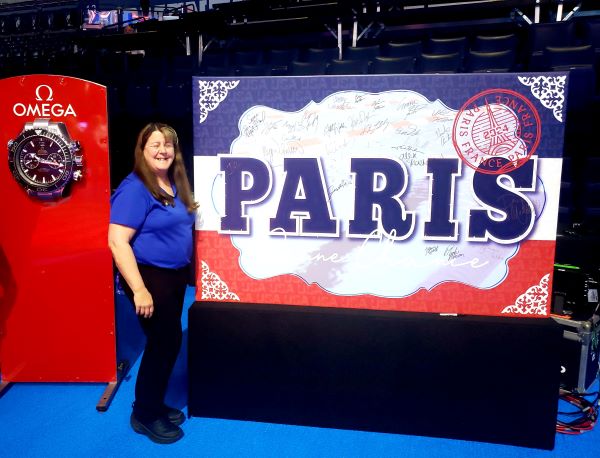
Huckeby says a network of people have allowed her to grow as an official.
“I have been blessed with some amazing mentors in Montana and across the country, people who opened doors for me to become an official and work at national level meets,” Huckeby said. “Marie Cook and Bill Severs were the Butte Tarpons coaches who encouraged me to become an official and then a coach. BTST officials Jodi Peretti, Cindy Micheletti, and Sandra Antonioli were some of my first mentors. Larry Johnson from Bozeman opened many more doors for me across the country and provided opportunities for me to hone my officiating skills. There have been so many more officials across the country who have provided opportunities for me to be selected to officiate at national meets and represent my hometown and state.”
Officials usually start out by working local meets across the state and then officiate at the state championships. From there one can apply to work at larger upper level meets across the country.
“My first experience at a larger meet was the Northwest Age Group Regional Championships in Federal Way, Washington,” Huckeby said. “There were 1,200-1,500 swimmers in attendance over the three-day meet. I was given an opportunity to not only officiate at this meet but to be mentored on how to officiate at upper-level swim meets which is different from local meets. From this meet I officiated at the Western Zone Age Group and Senior Championships, the Speedo Sectional meets, Futures Championships, Junior Nationals, TYR Pro Swim Series, Winter National Championships, US Open, and Summer National Championships. To work at these meets there is an application process, and one must be selected to officiate the meet and may be selected to officiate in any assigned team position such as chief judge, starter, deck referee, or administrative referee.”
There are approximately 15,000 officials in USA Swimming. For the 2024 US Olympic Trials Swimming, 72 officials were selected.
“USA Swimming undoubtedly has the best swimming officials in the world, Huckeby said. “To be selected as one of the Trials officials is such an honor for any official.”
Huckeby was first selected to officiate at the 2020 US Olympic Team Trials – Swimming in Omaha, Nebraska. There is no application process for this meet. USA Swimming selects the Olympic Trials officials from a pool of officials who have met all the criteria to be considered - including having N3 credentials (generally every official at Trials is an N3 deck referee), have experience officiating at national swim meets, has leadership experience at the state, zone, and/or national level, and other criteria.
“I didn’t know I was being considered until I received a letter that began with the sentence, ‘Congratulations, you have been selected!’” Huckeby said. “What an honor to be selected!”
The coronavirus pandemic caused the 2020 Olympics to be moved to 2021.
“The 2021 US Olympic Trials were split into two waves to accommodate everyone and follow the COVID protocols,” Huckeby said. “I was selected to officiate in the first group of swimmers. The second wave of swimmers were those who were faster and the potential to be name dot the US Olympic Team. The 2021 Trials were an amazing swim meet! Terrific swims, a small but great crowd of spectators, and an amazing group of officials. Definitely the experience of a lifetime!”
One swim stood out to Huckeby.
“Two US Naval Academy midshipmen took first and second place in one of the races,” Huckeby said. “The first two finishers in each race had the option to return the following week to race in the next wave of swimmers to attempt to qualify for the Olympic team. As the midshipmen finished their interview and went into the stands to receive congratulations from their team members, the announcer said the two young men had received leave to compete this week at Trials. He speculated would they be able to get more leave to come back the following week to compete again? The crowd started cheering for these two young midshipmen, ‘USA! USA! USA!’ It was an electric moment on deck watching those two young men who were serving our country as they won their event at Trials.”
Huckeby was shocked when she received another invite to the 2024 U.S. Olympic Swim Trials in Indianapolis, Indiana.
“I am so humbled and honored to again be selected to officiate at the US Olympic Trials,” Huckeby said. “I became the first Montana Swimming official to be selected to officiate at the US Olympic Trials - Swimming. I believe it is a great testament to the training we do in Montana Swimming to produce outstanding officials who can serve on any pool deck in the country.”
Approximately 1,000 swimmers entered the meet.
“Indy has a great tradition of hosting major sporting events, and they did an amazing job hosting the Olympic Trials,” Huckeby said. “The airport was decked out with banners and signs promoting Trials. Downtown Indy was a celebration of Trials with banners, signs, streets renamed after famous US Olympians, and much more. The Indianapolis Convention Center held the Aqua Zone – home to vendors, games, autograph booths, giveaways, and much more. Outside the Convention Center one street was turned into a celebration of artwork, food trucks, free concerts every evening, and featured a mini-Eiffel Tower replica. For the first time ever, Trials was being held in a football stadium – Lucas Oil Stadium.”
The football field had been removed and not one, but two portable pools were built by Myrtha Pools on the floor of the stadium. Holding Trials at a football stadium was a risk, as some worried fans might not fill the stadium. More than 20,000 people were in attendance for finals, breaking the previous attendance record for a swim meet set in 2016 at the Rio Olympics. That record was broken again when more than 22,000 people attended a few nights later. More than 285,000 people attended Trials.
“At Trials, the stroke and turn officials were divided into two teams,” Huckeby said. “One team officiated the women’s events and the other team officiated the men’s events. I served on the men’s events team. During finals each evening, the first officiating team up went on deck and stood in place during the evening’s opening ceremony. The lights would dim, then the music would start along with the light show. The feeling was electric, and one could feel the bass booming – even the water in the pool began to bounce and move to the bass sounds. Finally, the contestants for the first event were announced and finals began.”
Huckeby said it was a great honor to watch Montana athletes Liam Kerns formerly of the Billings Aquatic Club, and Katharine Berkoff formerly of the Missoula Aquatic Club.
“Katharine claimed the silver medal in the women’s 100-meter backstroke and won the bronze medal at the Olympics in Paris,” Huckeby said. “It was also fun to watch Jonny Kulow, a sprinter from Lander, Wyoming, who now swims for Arizona State. Jonny tied for eighth place in the semifinals of the 50-meter freestyle with Adam Chaney. This resulted in a swim off to determine who would move on to finals as only eight swimmers compete in finals. Dave Olack and I were the officials for the swim off at the finish end of the pool and Jonny was swimming in my lane. Towards the end of the race Dave and I stepped up on the bulkhead and picked up the button (to stop the semi-automatic timing system at the end of the race) and then observed the finish and pushed the button and stopped out stopwatches. As I set the button down, I looked up to see the time on the jumbotron. It was a tie! A huge smile spread across my face. In a rare double tie, the two swimmers had tied again and would need to swim off another time to determine who would move on to finals that evening. Adam went on to win the second swim off.”
The fun did not end with the races.
“Each evening, we watched as the gold medal winners were given their medals and announced on television that they were 2024 Paris Olympians. On the final night the entire US Olympic Swimming Team was announced to thunderous cheers by everyone in the stadium,” Huckeby said.
The success of the meet was palatable.
“On the final night the officials were invited upstairs to dinner with the leaders of USA Swimming. The USOPC (US Olympic and Paralympic Committee) and World Aquatics (who govern international aquatic competitions and the Olympics) sent their congratulations for the success of the US Olympic Trials,” Huckeby said. “They were in awe of how well the meet ran and how successful it was. World Aquatics declared the US had the best officials in the world.”
A surprise announcement was also made that the 2028 Olympics swimming venue would be SoFi Stadium, based on the success of the 2024 Olympics Trials.
“The success of the 2024 US Olympic Trials has forever altered how major swimming meets will be held,” Huckeby said. “The official’s motto for the meet was #BestMeetEver and it was. It was amazing to be a part of a swim meet that changed the sport going forward.”
Two U.S. officials are selected to officiate at the Olympics. This year Kathleen Scandary from Colorado will serve as a stroke and turn judge and Lisa Vetterlein from San Diego will be one of two starters for the event. There are also some other US officials who serve on the technical committee.
“Kathleen and Lisa are friends of mine and both are extraordinary officials,” Huckeby said.
She appreciates where competitive swimming has taken her over the years.
“Being involved with swimming has given me and my family amazing opportunities,” Huckeby said. “I couldn’t do what I do without the love and support of my family. I’ve loved watching my children compete in swim meets across the country. Today several of my children are still involved as athletes in Masters Swimming, coaches, and officials. My husband is an administrative official and travels to swim meets with me in Montana and Wyoming. I love mentoring other officials and giving back to the sport. I hold several positions with Montana Swimming, serve as the Western Zone DEI Coordinator, and serve on the USA Swimming Scholastic All America sub-committee. It has been such a joy to represent Butte, the state of Montana, and Montana Tech at the US Olympic Trials and at other swim meets across the country. The Butte Tarpons practiced for years at Montana Tech and Tech was always a great supporter of the team and I so appreciate that support. I am excited to continue to officiate both in Montana and across the country. This December I’ll serve as an assistant administrative referee at the US Open in Greensboro, North Carolina. I officiate for USA Swimming, US Masters, YMCA, US Paralympics, High School, as well as Special Olympics and Senior Olympics. I also lead the high school volleyball officials’ group in Butte and officiate high school and junior high volleyball each fall.”
Huckeby recommends that parents consider swimming as a sport for their family.
“Swimming is a lifelong sport that can save your life. If you or your children don’t know how to swim, please sign up for swim lessons today,” Huckeby said. “Swimming has been a great sport for my family, and it can be for your family too.”